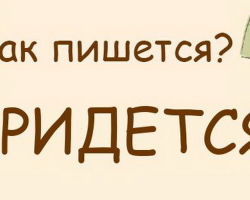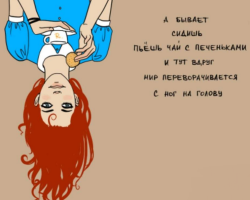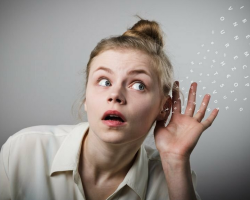Why are we experiencing deja vu? There are such outbreaks as a reminder of the purpose of the soul or is it a physiological process of brain work? Read more about this in our article.
Content
- How is the deja vu effect felt?
- What is the effect of dejavu?
- Echoes of dreams
- Memory of past lives
- Pathology of the function of the brain
- Time loop
- One of the realities
- The work of the subconscious
- Dejavu in the laboratory
- Video: What is dejavu? The reasons and the secret of Dejavu - what it is and why is the effect of Dejavu.
Similarly, such a situation was already, the same people, the same environment, exactly the same sounds and smells. Surely, each of us at least once felt the appearance of the “deja vu” effect, when reality seems to bifurcate and slip away, but at the same time we notice with the ultimate clarity that all this happened to us. What causes this condition - the work of the subconscious, scraps of dreams, memories from past lives or violation of the function of perception of information?
How is the deja vu effect felt?
- Often a sudden feeling of recognition appears in the simplest everyday environment. The scene is recalled in absolutely accurate details. It seems even known what will happen for a couple of moments ahead.
- A person realizes that in such a situation he is for the first time, sometimes not familiar with the interlocutor or does not know the place in which he ended up, but he absolutely feels that all this was already with him. Only now it is impossible to remember when?
- Everyone who experienced such a state will agree that curiosity, the illusion of clairvoyance, something incomprehensible, is added to an amazing feeling. It seems that now something extraordinary will happen, there will be an opportunity to deceive the laws of time and space, to look into the future.
- But after a couple of seconds, everything disappears and returns to reality, the past remains unchanged, the future is unknown, the present is quite ordinary.

What is the effect of dejavu?
The phenomenon of sudden memory for centuries has been interested in researchers from completely different fields of knowledge - medicine, psychology, parapsychology, esotericism, accurate sciences. Although the term itself, which received its name from the phrase déjà-vu-“already seen”, appeared only in the 19th century, scientists and philosophers from ancient eras worked on this mystery.
- Some thinkers believed that these were echoes of memories of previous lives, others were a manifestation of the law on the cyclicality of existence.
- Aristotle, trying to find an explanation from the perspective of a scientific approach, argued that such a condition is often inherent in people with a mental disorder or impaired brain function.
- For the first time, the term appeared in the book of the French psychologist Emil Buarak. But for a long time it was believed that it was not possible to fix this fleeting state and in detail in detail.
Dejavu is an ambiguous and sometimes mystical phenomenon, since it concerns not only memory, but also a subtle world of feelings and emotions of a person. This condition is not controlled by either the person himself or by any external factors.
- According to modern research, more than 95% of people in the world experienced such outbreaks of recognition of a stranger. Some respondents claim that this happens to them regularly, especially in a state of nervous tension, irritation, and stressful situations.
- People with a genetic predisposition or suffering from mental illness experience outbreaks of sudden recognition more often than others.

Echoes of dreams
- The founder of the theory of psychoanalysis Z. Freud had no doubt that the effect of deja vu was a trace of a forgotten or unpleasant memory of a strong psycho -emotional shock or unfulfilled desire. In other words, this is a reminder of our unrealistic aspirations or suppressed fears, when the situation experienced at the moment finds a response in our subconscious.
- From the point of view of psychology, the dejavu effect is also considered in a close relationship with the sphere of dreams. This area of \u200b\u200bresearch is not yet well studied. The nature of dreams in itself is a mystery.
- Modern psychologists believe that during sleep, the human brain modifies paintings that are experienced or pondered in reality. There can be a lot of options for such situations, some are close to life.
- Not all dreams can remember, but their plots remain deep in our memory and can arise in a figurative memory if a person experiences something similar in reality.
- Since a person does not remember that he dreamed, there is a feeling of finding out as if it had already happened to him. Finding in a similar situation with the same people or in the same environment, a person can even unconsciously repeat his actions from a forgotten dream, while experiencing the effect of deja vu.

Memory of past lives
Researchers in the field of esotericism and parapsychology believe that the effect of deja vu is the result of the memory of reincarnation. What looks familiar, a person really could see or worry in one of the past lives. No matter how supernatural this assumption may be, representatives of various fields of scientific knowledge in different time periods sought to justify and prove it.
- The researcher Andrei Polyansky in his writings explains that the hypothesis of the rebirth of the soul was always present in one form or another among different peoples, beliefs and spiritual directions. Our consciousness is able to endure local thoughts and experienced experience into present life.
- The Swiss philosopher Karl Gustav Jung called the resettlement of the soul a genetic memory - in this way, he tried to explain the occurrence of the effect of deja vu from a scientific point of view.
- Hypnotherapist Dolores Klenon believes that the energy memory called the soul of a person before the next embodiment predicts his new life path. Moments of the dejavu effect are signals about the direction in life that was chosen.

Pathology of the function of the brain
The latest achievements in the field of medicine debunk such interpretations of the phenomenon. Scientists have proven that the effect of deja vu is a functional failure in the brain.
- The study of the pathologies of the brain allowed neurophysiologists to detect the cause of a sudden recognition of the situation in the short -term dysfunction of one of the brain parts - the hippocampus, which is responsible for the memory.
- As a result of this state, there is a violation of associative connections between the processing of new information and memory, and we will recognize the surrounding us for a brief moment. Since the zone of long -term memory at this moment is active, its impulse is a little ahead of the ability of perception - a state of “recognition of the future” arises for a few seconds ahead.
- That is why most often the effect of deja vu is experienced by people in a state of stress, mental and emotional overstrain or suffering from impaired brain function.

Time loop
To explain the effect of dejavu arising in everyday situations, there is a theory about the loop of time.
- If you perceive time exclusively linearly, then everything that has already happened is the past that is happening now - the present, and what will happen is the future. Such an interpretation of the course of time is not entirely correct.
- For example, some words spoken aloud can constantly repeat in our head or an echoed melody echoed in memory. Preparing for any conversation, we mentally prepare the necessary phrases in advance.
- All our actions are based on previous experience and an attempt to predict the future. It turns out that the perception of the present is not separately - it is always inextricably linked with the past and future.
Such a fantastic explanation as an assumption of failure during the time is offered by physicists.
- According to some researchers, time does not flow linearly, but exists multi -layered. And it is also necessary to perceive it as a three -dimensional space. That is, all the events that have occurred or will still occur are in all temporary dimensions at the same time.
- The dejavu effect arises when the loop of time is formed - information about the nearest events from the future becomes available in the present.

One of the realities
One version can also be considered - the existence of parallel realities.
- Our future has countless options. Every second we make any choice and give rise to one or another development of reality. For example, putting on a blue jacket, you live the reality in which you are in this jacket, and not a green sweater, for example.
- If reality is in contact at one point, the recognition effect occurs. For example, in one of the options you put on a yellow dress and went to the cinema, but on the way you met a girlfriend. In another reality, you in a tracksuit went out for bread in the evening and met the same girlfriend. Events from two possible realities crossed, causing the effect of deja vu.

The work of the subconscious
Another theory is the assumption that the effect of deja vu is a reminder of his own multidimensional life plan. It points to us:
- Each person is capable of more.
- The past, present and future are a life road with many opportunities.
- The soul has development potentials, possibly still hidden.
- What seems to us recognizable is one of our own forecasts built in the subconscious.
Dejavu in the laboratory
There are quite interesting experiments to reproduce the effect of deja vu.
- The participants in the study were offered some sounds and images, and then they were forced to forget what they saw in a state of hypnosis.
- When they were again shown the same sound and visual signals, certain zones of the brain were activated in the tested and a feeling of deja vu arose.
- Based on the results of the experiment, it was concluded that the effect of Dejavu was not a new impression, but an old, but for some reason a forgotten memory.
However, there is no unequivocal understanding of the causes of the effect of deja vu. Edward Titcheener proposed the following definition:
If ever in the past there was an unconscious or incomplete perception of the object (situation) based on the subconscious, but the integral, but only a fragmentary picture of memory was formed, then when the individual elements are repeated, the memory completes the picture-the effect of dejaugu arises.
The effect of deja vu is attractive to its versatility and the realization that life is not so measured and simple - there is something more in it that you need to think about.







